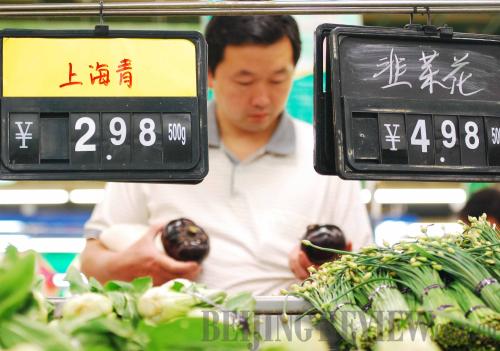|
 |
|
DECIDING ON A PURCHASE: A customer buys vegetables in a supermarket in Jiujiang, Jiangxi Province. The prices of farm produce in China soared in recent months (HU GUOLIN) |
Li Yining, Professor of Economics at Peking University:
Many people have been calling for a return to normal levels of money supply, as inflation is always a monetary phenomenon. As for China, we should clarify the following questions.
First, what is an appropriate level of money supply growth? It should not be decided by developed countries' experiences because China is going through a period of economic transition. Its industrial structure is being adjusted. The urban-rural gap is still big. If we used developed countries' standard to judge China's current money supply, their normal level would mean a tight one for us.
Second, can we substantially reduce the yuan counterparts of our $3-trillion foreign exchange reserves to ensure the normal level of money supply? I don't think we can.
Third, what is a normal level for the money supply? Enterprises of different sizes must have different responses to the current money supply. Aggregate quantitative control like the reserve requirement ratio hikes has brought about a widespread credit squeeze among those small and medium-sized enterprises. In this sense, there is no unified normal level of money supply.
Fourth, what's the impact of an overly tight money supply? Under the current situations, a return to normal levels of money supply can disrupt enterprises' flow of capital and further cause the enterprises' supply chain to disconnect. In the worst scenario, many companies would suspend production and lay off workers.
Finally is it likely for China to experience a wave of stagflation? In economics there are two important kinds of expectations. One is inflation expectations and the other is corporate expectations for earnings. Alleviating people's inflation expectations will be effective for tackling inflation. But if corporate expectations for earnings are neglected, companies will reduce investment and even shut down some operations. Once companies decide to hold back new investments, this would produce a chain of adverse effects including a slowdown in GDP, an increase in unemployment and a reduction in tax revenue. This would trigger stagflation.
As people's inflation expectation and corporate expectations for profitability prospects are two important economic indicators, the government should pay equal importance to both when taking measures to contain money supply.
Chi Fulin, President of the China Institute for Reform and Development:
Before we answer the question about whether swelling investment is the major factor driving inflation, let's consider the following facts.
All provinces and autonomous regions set their own GDP growth rate 50 percent higher than the national average target for the 12th Five-Year Plan (2011-15). Ambitious local governments boosted investment to ensure their growth target, which inevitably drove up the price for raw materials, energy and other commodities. It not only placed more weight on inflation, but also made inflation control a growing headache.
Actually, to effectively control inflation, China needs to transfer its economic growth model from investment driven to consumption propelled as soon as possible. The fact is that residents' consumption demands are doomed to be the indigenous driving force of economic growth in China. In this sense, short-term efforts to curb inflation and long-term policies to boost consumption and to sustain growth should be combined.
Essentially, the economic growth model led by the government must be changed if we want to increase consumption. In my view, the government-led growth model has long been the root cause for unbalanced economic structure and swelling investment. Although it did make contributions to rapid growth in the past years, it needs to be changed today since interior and exterior conditions have changed. | 